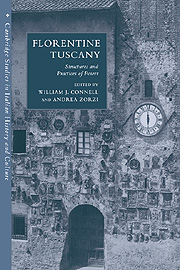Book contents
- Frontmatter
- Contents
- List of figures
- List of tables
- List of abbreviations of archival sources
- Introduction
- 1 The ‘material constitution’ of the Florentine dominion
- 2 The language of empire
- 3 Constitutional ambitions, legal realities and the Florentine state
- 4 Fiscality, politics and dominion in Florentine Tuscany at the end of the middle ages
- 5 Market structures
- 6 State-building, church reform and the politics of legitimacy in Florence, 1375–1460
- 7 The humanist citizen as provincial governor
- 8 Territorial offices and officeholders
- 9 Demography and the politics of fiscality
- 10 Florentines and the communities of the territorial state
- 11 Patronage and its role in government: the Florentine patriciate and Volterra
- 12 San Miniato al Tedesco: the evolution of the political class
- 13 The social classes of Colle Valdelsa and the formation of the dominion (fourteenth–sixteenth centuries)
- 14 Arezzo, the Medici and the Florentine regime
- 15 Rubrics and requests: statutory division and supra-communal clientage in Pistoia
- 16 A comment
- Index
- CAMBRIDGE STUDIES IN ITALIAN HISTORY AND CULTURE
7 - The humanist citizen as provincial governor
Published online by Cambridge University Press: 16 September 2009
- Frontmatter
- Contents
- List of figures
- List of tables
- List of abbreviations of archival sources
- Introduction
- 1 The ‘material constitution’ of the Florentine dominion
- 2 The language of empire
- 3 Constitutional ambitions, legal realities and the Florentine state
- 4 Fiscality, politics and dominion in Florentine Tuscany at the end of the middle ages
- 5 Market structures
- 6 State-building, church reform and the politics of legitimacy in Florence, 1375–1460
- 7 The humanist citizen as provincial governor
- 8 Territorial offices and officeholders
- 9 Demography and the politics of fiscality
- 10 Florentines and the communities of the territorial state
- 11 Patronage and its role in government: the Florentine patriciate and Volterra
- 12 San Miniato al Tedesco: the evolution of the political class
- 13 The social classes of Colle Valdelsa and the formation of the dominion (fourteenth–sixteenth centuries)
- 14 Arezzo, the Medici and the Florentine regime
- 15 Rubrics and requests: statutory division and supra-communal clientage in Pistoia
- 16 A comment
- Index
- CAMBRIDGE STUDIES IN ITALIAN HISTORY AND CULTURE
Summary
Giannozzo Manetti was angry. By rights the case should have appeared months earlier in his court in the Mugello: the Eight of Security (Otto di guardia) in Florence should never have been involved. On 11 December 1452, Manetti was pronouncing judgment in a number of criminal cases in the Palace of the Vicar at Scarperia, about 30 km to the north of Florence. Scarperia was a fortified town of perhaps 220 inhabitants and capital of the Vicariate of the Mugello, a hilly and strategically important area of the Florentine dominion. Manetti, the well-known humanist, was then serving as governor, or ‘Vicar’ as the office was called. For six months, from 1 August 1452 to 1 February 1453, he was responsible for administering both civil and criminal justice in the Mugello. He was accompanied to his post by a retinue, known as a famiglia, which included a knight, a notary, four pages, fifteen retainers and five horses; and he received a salary of 2000 lire.
The case that so upset Manetti began with an incident which took place in September of that year in the popolo of S. Maria di Peretola, a rural parish of about 420 inhabitants, which lay in the plain just 4 km north of Florence in the southernmost part of the Vicariate.
- Type
- Chapter
- Information
- Florentine TuscanyStructures and Practices of Power, pp. 144 - 164Publisher: Cambridge University PressPrint publication year: 2000



